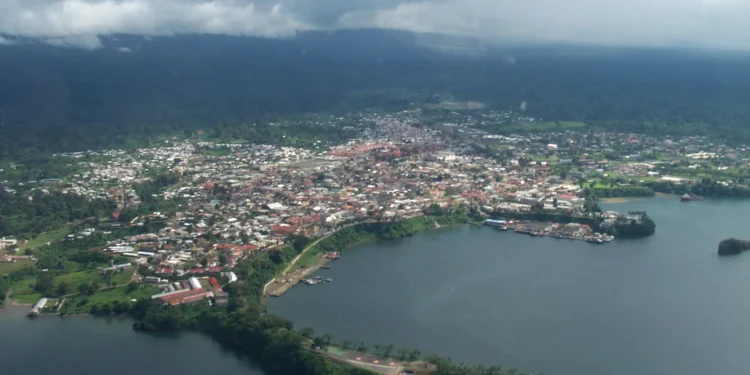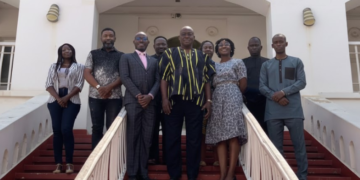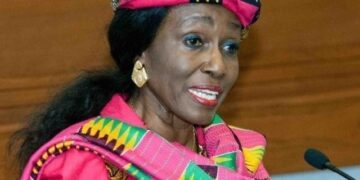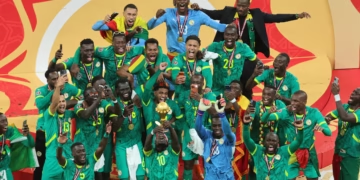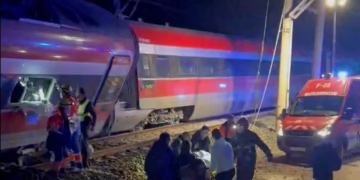MALABO, Sept 14 (The African Portal) – In July 2024, residents of Annobón Island in Equatorial Guinea petitioned the government over the use of dynamite by a Moroccan construction company operating on the island.
What began as a community grievance, however, turned into an unexpected punishment. Instead of addressing their concerns, the government imposed a yearlong internet blackout on the island.
Since then, residents have endured persistent internet disruptions, effectively cutting them off from the rest of the world. The community, which had sought protection from harmful blasting activities, now finds itself silenced through digital isolation.
Dozens of the signatories and residents were imprisoned for nearly a year, while internet access to the small island has been cut off since then, according to several residents and rights groups.
Local residents interviewed by The Associated Press left the island in recent months, citing fear for their lives and the difficulty of living without internet. Banking services have shut down, hospital emergency services have been halted, and residents say they are burdened with unaffordable phone bills since cellphone calls are now their only means of communication.
When governments shut down the internet, they often instruct telecom providers to cut connections to designated locations or block access to specific websites, although it remains unclear how the shutdown works in Annobón.
The internet blackout remains in effect, residents confirmed alongside activists, at a time when the Trump administration has considered loosening corruption sanctions on the country’s vice president. The Moroccan company Somagec, which activists allege is linked to the president, confirmed the outage but denied responsibility. The AP could not confirm any direct link.
“The current situation is extremely serious and worrying,” one of the signatories who spent 11 months in prison said, speaking anonymously for fear of government retaliation.
Repression Ramps Up
In addition to the internet shutdown, “phone calls are heavily monitored, and speaking freely can pose a risk,” said Macus Menejolea Taxijad, a resident who recently went into exile.
It is only the latest of a series of repressive measures deployed by the government to crush criticism, including mass surveillance, according to a 2024 Amnesty International report.
Equatorial Guinea, a former Spanish colony, is ruled by Africa’s longest-serving president, Teodoro Obiang Nguema Mbasogo. At 83, he has led the country for more than half his life. His son, the vice president, has been accused of lavish spending with state funds, convicted of money laundering and embezzlement in France, and sanctioned by the U.K.
Despite the country’s oil and gas wealth, at least 57% of its nearly 2 million people live in poverty, according to the World Bank. Meanwhile, officials, their families, and their inner circle enjoy lives of luxury.
The Equatorial Guinea government did not respond to the AP’s inquiry about Annobón, its condition, or its internet access.
Annobón’s Troubled History
Located in the Atlantic Ocean about 315 miles (507 kilometers) from Equatorial Guinea’s coast, Annobón is one of the country’s poorest islands and often at odds with the central government. With a population of around 5,000, the island has long sought independence, accusing Malabo of neglecting its residents.
The internet shutdown is the latest in a long history of repressive responses to Annobón’s political and economic demands. Activists cite regular arrests and the lack of adequate social amenities such as schools and hospitals.
“Their marginalization is not only from a political perspective, but from a cultural, societal and economic perspective,” said Mercè Monje Cano, secretary-general of the Unrepresented Peoples and Nations Organization.
A new airport, built by Somagec in 2013, was supposed to connect Annobón to the rest of the country. But little has improved, locals and activists say. The internet shutdown has instead worsened living conditions, collapsing key services including health care and banking.
Using Internet Outages to Silence Protest
In 2007, Equatorial Guinea entered into a business deal with Somagec, a Moroccan construction company that develops ports and electricity systems across West and Central Africa.
Annobón’s geological formation and volcanic past make the island rich in rocks and expand Malabo’s influence in the oil-rich Gulf of Guinea. Somagec has built a port on the island and, according to activists, has engaged in mineral extraction since beginning operations there.
Residents and activists say the company’s dynamite blasting in open quarries has polluted farmland and water supplies. Despite local opposition, the company’s work continues.
Hoping to pressure authorities, residents submitted complaints in July 2024. Instead, President Obiang deployed a repressive tactic increasingly common across Africa: shutting down internet access to silence protests and criticism.
“This is the first time the government cut off the internet because a community has a complaint,” said Tutu Alicante, an Annobón-born activist who runs the EG Justice human rights group.
According to Felicia Anthonio of Access Now, an internet rights advocacy organization, the internet’s power to enable citizens to challenge leaders threatens authorities. “So, the first thing they do during a protest is go after the internet,” she said.
Somagec CEO Roger Sahyoun denied involvement in the shutdown, claiming the company itself has had to rely on a private satellite. He defended the blasting as necessary for construction projects, saying all environmental and geotechnical studies had been carried out.
“After having undertaken geotechnical and environmental impact studies, the current site where the quarry was opened was confirmed as the best place to meet all the criteria,” Sahyoun said in an email.
Meanwhile, Annobón residents remain cut off. Even the company’s private satellite connection is inaccessible to them.
“Annobón is very remote and far from the capital and the rest of the continent,” said Alicante. “So you’re leaving people there without access to the rest of the continent … and incommunicado.”
This article was written with additional files from the Associated Press and BBC
